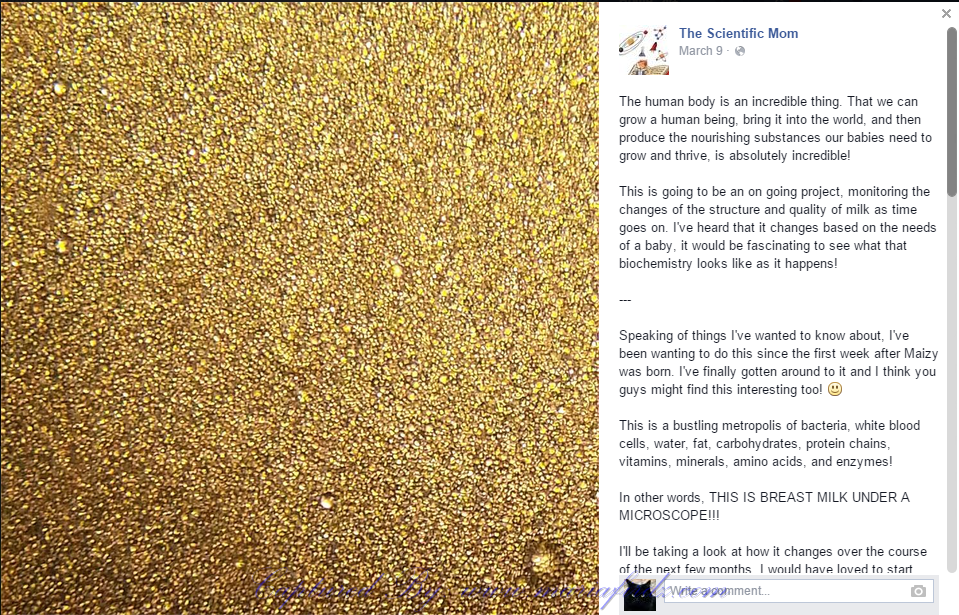بِسْمِ اللَّهِ الرَّحْمَنِ الرَّحِيم
(Dengan Nama Allah Yang Maha Pemurah Lagi Maha Penyayang)
Info awal MF dapat kawan MF di facebook dari minggu lepas... Tapi biasalah, MF bukan jenis nak mudah percaya dengan sesuatu info kan... Jadi, MF buat dulu carian dan bacaan internet... Cari sumber asal...
Sumber asal MF jumpa di facebook juga iaitu di The Scientific Mom:
Ini rupa susu ibu yang dilihat dibawah microskop:
Nampak kan... ini dia ambil colostrum iaitu susu awal ibu... memang nampak keemasan betul kan... kalau tengok gitu pun susu awal ni warna kuning berbanding susu ibu yang dah beberapa hari selepas bersalin...
MF buat lagi pembacaan dan carian... Akhirnya MF jumpa satu info... tulisan dari blogger Indonesia... tapi dia pun ambil dari sumber lain.. Tapi sumber tu agak kukuh sebabnya, ianya merupakan satu kajian pelajar U tentang susu ibu... MF cuba kongsikan di sini ya... tanpa ubah ayat asal.. tapi harap semua boleh faham la...
Komposisi yang terkandung dalam susu ibu :
Water
Carbohydrates (energy source)
Lactose
Oligosaccharides (see below)
Carboxylic acid
Alpha hydroxy acid
Lactic acid
Proteins (building muscles and bones)
Whey protein
Alpha-lactalbumin
HAMLET (Human Alpha-lactalbumin Made Lethal to Tumour cells)
Lactoferrin
Many antimicrobial factors (see below)
Casein
Serum albumin
Non-protein nitrogens
Creatine
Creatinine
Urea
Uric acid
Peptides (see below)
Amino Acids (the building blocks of proteins)
Alanine
Arginine
Aspartate
Clycine
Cystine
Glutamate
Histidine
Isoleucine
Leucine
Lycine
Methionine
Phenylalanine
Proline
Serine
Taurine
Theronine
Tryptophan
Tyrosine
Valine
Carnitine (amino acid compound necessary to make use of fatty acids as an energy source)
Nucleotides (chemical compounds that are the structural units of RNA and DNA)
5’-Adenosine monophosphate (5”-AMP)
3’:5’-Cyclic adenosine monophosphate (3’:5’-cyclic AMP)
5’-Cytidine monophosphate (5’-CMP)
Cytidine diphosphate choline (CDP choline)
Guanosine diphosphate (UDP)
Guanosine diphosphate - mannose
3’- Uridine monophosphate (3’-UMP)
5’-Uridine monophosphate (5’-UMP)
Uridine diphosphate (UDP)
Uridine diphosphate hexose (UDPH)
Uridine diphosphate-N-acetyl-hexosamine (UDPAH)
Uridine diphosphoglucuronic acid (UDPGA)
Several more novel nucleotides of the UDP type
Fats
Triglycerides
Long-chain polyunsaturated fatty acids
Docosahexaenoic acid (DHA) (important for brain development)
Arachidonic acid (AHA) (important for brain development)
Linoleic acid
Alpha-linolenic acid (ALA)
Eicosapentaenoic acid (EPA)
Conjugated linoleic acid (Rumenic acid)
Free Fatty Acids
Monounsaturated fatty acids
Oleic acid
Palmitoleic acid
Heptadecenoic acid
Saturated fatty acids
Stearic
Palmitic acid
Lauric acid
Myristic acid
Phospholipids
Phosphatidylcholine
Phosphatidylethanolamine
Phosphatidylinositol
Lysophosphatidylcholine
Lysophosphatidylethanolamine
Plasmalogens
Sphingolipids
Sphingomyelin
Gangliosides
GM1
GM2
GM3
Glucosylceramide
Glycosphingolipids
Galactosylceramide
Lactosylceramide
Globotriaosylceramide (GB3)
Globoside (GB4)
Sterols
Squalene
Lanosterol
Dimethylsterol
Methosterol
Lathosterol
Desmosterol
Triacylglycerol
Cholesterol
7-dehydrocholesterol
Stigma-and campesterol
7-ketocholesterol
Sitosterol
β-lathosterol
Vitamin D metabolites
Steroid hormones
Vitamins
Vitamin A
Beta carotene
Vitamin B6
Vitamin B8 (Inositol)
Vitamin B12
Vitamin C
Vitamin D
Vitamin E
a-Tocopherol
Vitamin K
Thiamine
Riboflavin
Niacin
Folic acid
Pantothenic acid
Biotin
Minerals
Calcium
Sodium
Potassium
Iron
Zinc
Chloride
Phosphorus
Magnesium
Copper
Manganese
Iodine
Selenium
Choline
Sulpher
Chromium
Cobalt
Fluorine
Nickel
Metal
Molybdenum (essential element in many enzymes)
Growth Factors (aid in the maturation of the intestinal lining)
Cytokines
interleukin-1β (IL-1β)
IL-2
IL-4
IL-6
IL-8
IL-10
Granulocyte-colony stimulating factor (G-CSF)
Macrophage-colony stimulating factor (M-CSF)
Platelet derived growth factors (PDGF)
Vascular endothelial growth factor (VEGF)
Hepatocyte growth factor -α (HGF-α)
HGF-β
Tumor necrosis factor-α
Interferon-γ
Epithelial growth factor (EGF)
Transforming growth factor-α (TGF-α)
TGF β1
TGF-β2
Insulin-like growth factor-I (IGF-I) (also known as somatomedin C)
Insulin-like growth factor- II
Nerve growth factor (NGF)
Erythropoietin
Peptides (combinations of amino acids)
HMGF I (Human growth factor)
HMGF II
HMGF III
Cholecystokinin (CCK)
β-endorphins
Parathyroid hormone (PTH)
Parathyroid hormone-related peptide (PTHrP)
β-defensin-1
Calcitonin
Gastrin
Motilin
Bombesin (gastric releasing peptide, also known as neuromedin B)
Neurotensin
Somatostatin
Hormones (chemical messengers that carry signals from one cell, or group of cells, to another
via the blood)
Cortisol
Triiodothyronine (T3)
Thyroxine (T4)
Thyroid stimulating hormone (TSH) (also known as thyrotropin)
Thyroid releasing hormone (TRH)
Prolactin
Oxytocin
Insulin
Corticosterone
Thrombopoietin
Gonadotropin-releasing hormone (GnRH)
GRH
Leptin (aids in regulation of food intake)
Ghrelin (aids in regulation of food intake)
Adiponectin
Feedback inhibitor of lactation (FIL)
Eicosanoids
Prostaglandins (enzymatically derived from fatty acids)
PG-E1
PG-E2
PG-F2
Leukotrienes
Thromboxanes
Prostacyclins
Enzymes (catalysts that support chemical reactions in the body)
Amylase
Arysulfatase
Catalase
Histaminase
Lipase
Lysozyme
PAF-acetylhydrolase
Phosphatase
Xanthine oxidase
Antiproteases (thought to bind themselves to macromolecules such as enzymes and as a result
prevent allergic and anaphylactic reactions)
a-1-antitrypsin
a-1-antichymotrypsin
Antimicrobial factors (are used by the immune system to identify and neutralize foreign objects,
such as bacteria and viruses.
Leukocytes (white blood cells)
Phagocytes
Basophils
Neutrophils
Eoisinophils
Macrophages
Lymphocytes
B lymphocytes (also known as B cells)
T lymphocytes (also known as C cells)
sIgA (Secretory immunoglobulin A) (the most important antiinfective factor)
IgA2
IgG
IgD
IgM
IgE
Complement C1
Complement C2
Complement C3
Complement C4
Complement C5
Complement C6
Complement C7
Complement C8
Complement C9
Glycoproteins
Mucins (attaches to bacteria and viruses to prevent them from clinging to mucousal tissues)
Lactadherin
Alpha-lactoglobulin
Alpha-2 macroglobulin
Lewis antigens
Ribonuclease
Haemagglutinin inhibitors
Bifidus Factor (increases growth of Lactobacillus bifidus - which is a good bacteria)
Lactoferrin (binds to iron which prevents harmful bacteria from using the iron to grow)
Lactoperoxidase
B12 binding protein (deprives microorganisms of vitamin B12)
Fibronectin (makes phagocytes more aggressive, minimizes inflammation, and repairs damage caused by inflammation)
Oligosaccharides (more than 200 different kinds!)
Sumber dari: What's in Breastmilk Poster : Developed as a student project for the Breastfeeding Course for Health Care Providers, Douglas College, New Westminster, BC, Canada - © 2007 by Cecily Heslett, Sherri Hedberg and Haley Rumble. Artikel asal dan Penuh boleh baca: http://catatanbundabekerja.blogspot.com/2013/07/asi-vs-susu-formula-apa-perbedaannya.html .
Jadi, tak hairanlah jika ada yang gelarkan susu ibu dengan titisan emas... Apa-apa pun boleh cuba lihat sendiri bagi yang ada keluarga atau adik beradik bekerja di makmal yang ada mikroskop canggih untuk cuba lihat sendiri benar atau tidak kan...
Namun, yang pasti MF pernah buat ekspirimen masak susu ibu atas api... dan yang terjadi ialah darah... sebab susu ibu adalah asalnya darah...tapi bila keluar adalah susu... Sebenarnya, penciptaan susu ibu jika difikirkan betapa Maha Bijaksana Allah kan.. Dari darah, bila keluar jadi susu... bahkan bila dilihat dizoom dengan microskop warnanya keemasan dan merupakan sel aktif yang bergerak-gerak bahkan mengandungi beribu-ibu khasiat dan nutrisi lengkap untuk bayi... Kerana itulah susu ibu ternyata dalam al-Quran... dan tempoh 2 tahun yang disebut dalam al-Quran cukup sempurna untuk kehidupan seorang anak... Indahnya aturan Islam...dan hebatnya kuasa Allah.
Jadi usahalah sedday mungkin untuk bagi susu ibu ya... bagi yang dah usaha tapi takde hasilnya atau kes-kes terpencil jangan terasa... Allah tahu apa yang terbaik untuk anda.. kerana semua ibu nakkan yang terbaik untuk anaknya...
Jadi usahalah sedday mungkin untuk bagi susu ibu ya... bagi yang dah usaha tapi takde hasilnya atau kes-kes terpencil jangan terasa... Allah tahu apa yang terbaik untuk anda.. kerana semua ibu nakkan yang terbaik untuk anaknya...





Subhanallah....
BalasPadamnsb lah akak sempat bg aiyan susu ibu sampai 6bln jgk... lpstu dia dh takmo isap, pam2 pun dh tkamo kuar.... bkn takmo bg tp aiyan kn ada masalah jantung awal2 tu dia mcm penat sgt nk isap susu.... tp ttp rasa bertuah dpt susu kan aiyan sampai 6bln... lps tu amik susu formula smpai skrg
sya skg tgh bf bby 1 thn 3 bln...mmg air susu klo dibiarkn lma x masuk peti ais jd drh
BalasPadamsusu ibu tiada tandingan...
BalasPadamwahhh itulah kuasa kebesaran Allah SWT...
BalasPadamSubhanallah...
BalasPadamBgus Info ni untuk mengalakkan ibu2 yang berkemampuan menyusu anak tu memilih susu ibu.. sebab ada orang memang takde rezeki menyusu anak.. ada orang memang tak nak menyusu anak sebab nak jaga aset katanya... tapi akak menyusu jer.. takde la aset jadi buruk pun hehehehe
BalasPadamallahuakbar
BalasPadammmg mahal susu ibu
Subhanallah..ini semua anugerah n rezeki dr Allah..sedih bila ada ibu2 yg sgja xnk bf .mcm kata cik suria lekatlekit tu -> nk jaga aset..xpe..hak masing2.. 😊 tuan blog MF..mohon share boleh?tQ in advance..
BalasPadam